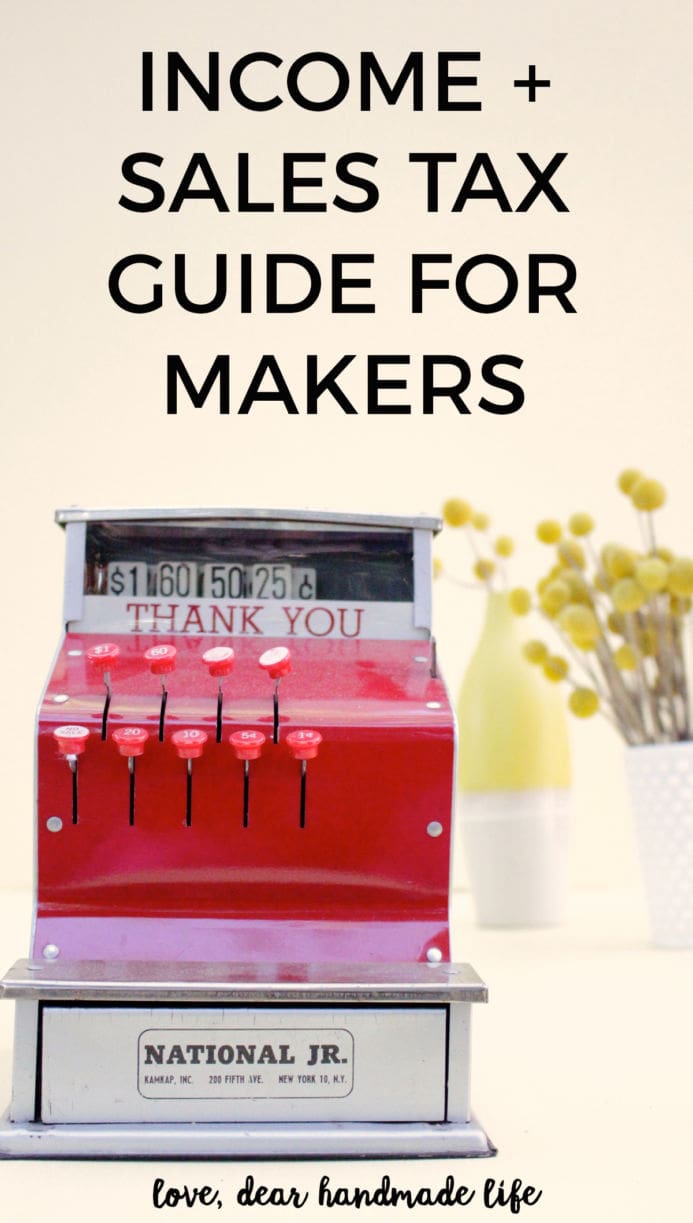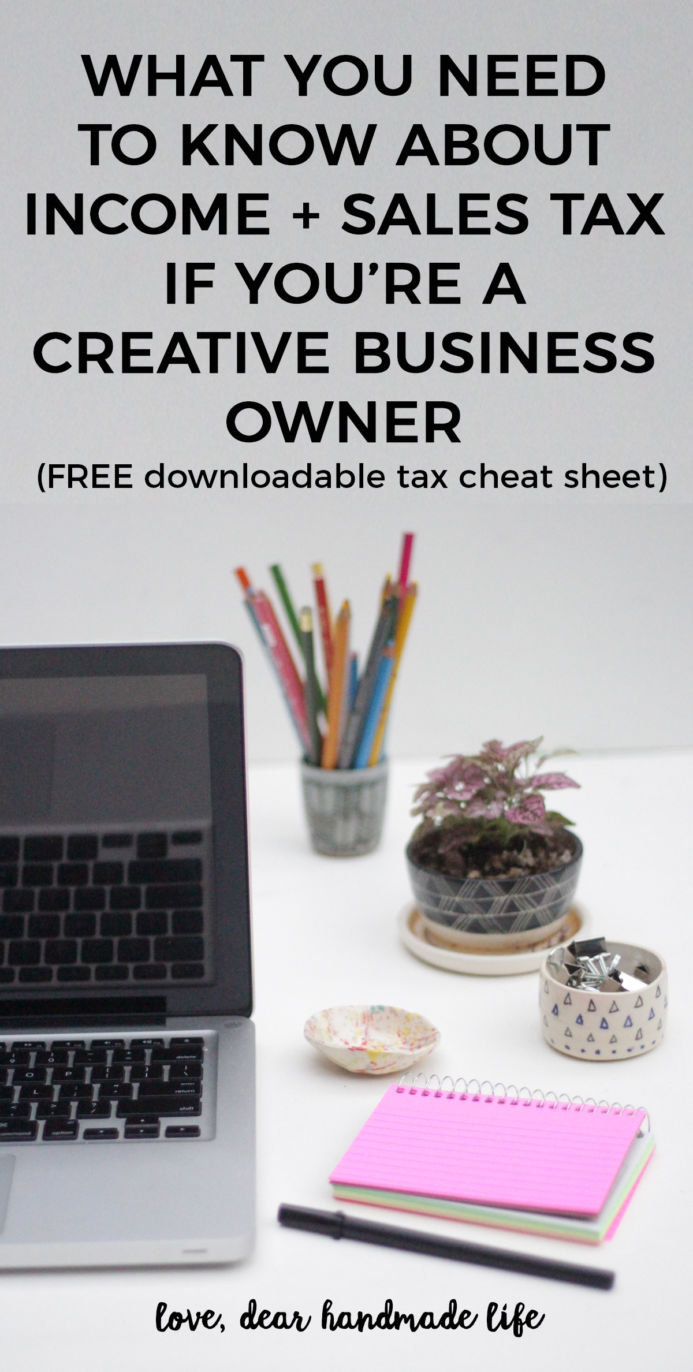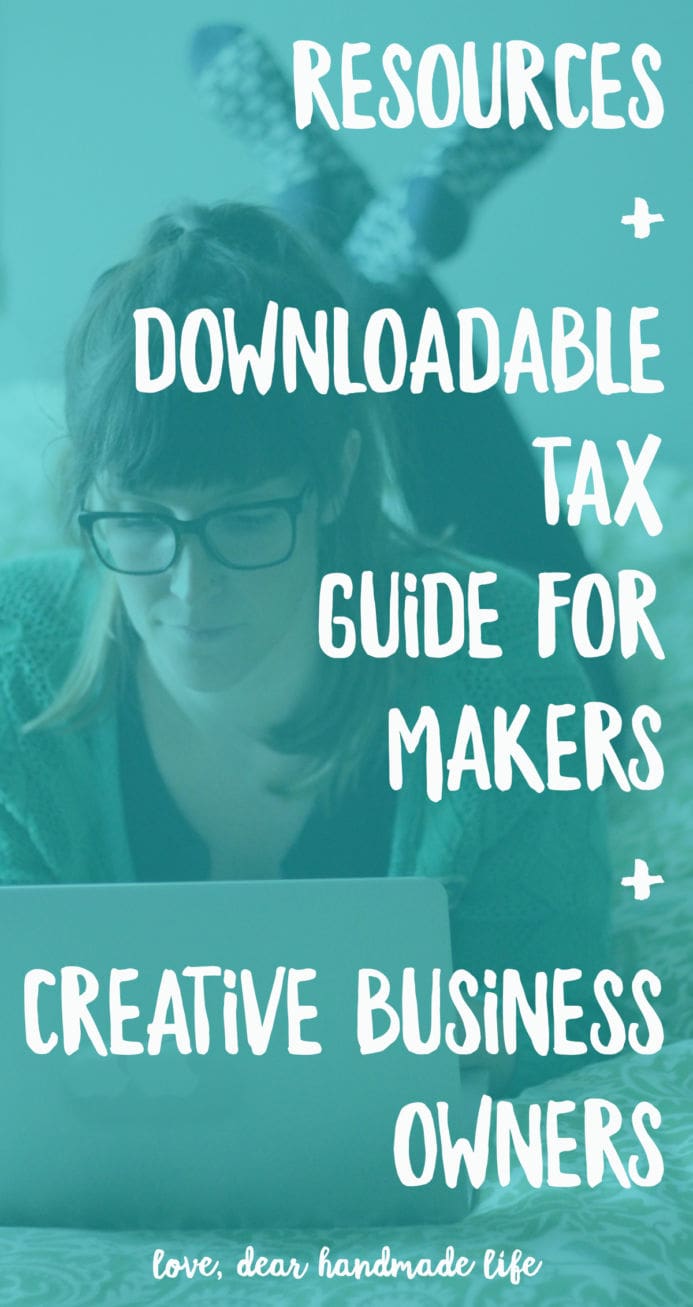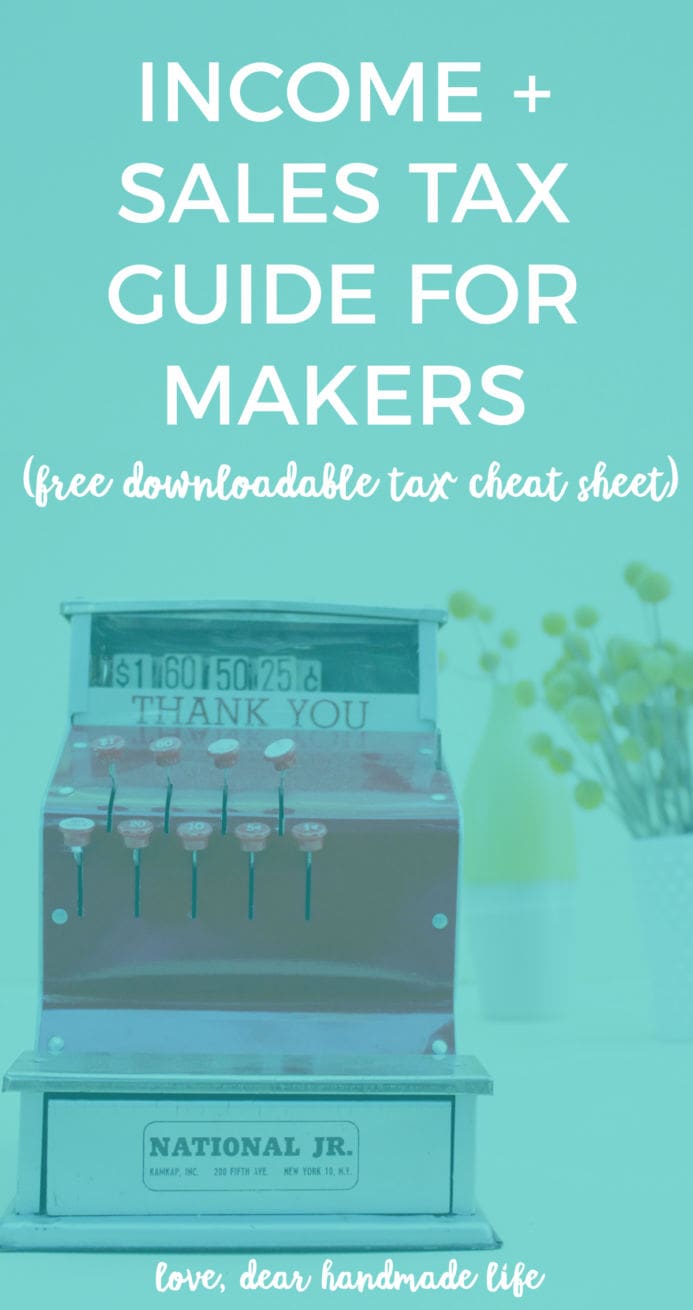Income and sales tax guide for makers
Editor’s note: We’re excited to welcome Janet (an accountant and the founder of Paper + Spark) to the Dear Handmade Life blog. Janet has some great tips and a FREE downloadable quick tax guide for makers!
P.S. – I can’t talk about finance and money without mentioning one of my favorite finance-related books – Jen Sincero’s How to be a Badass at Making Money. It’s a quick read and full of support and exercises to help you get into the money making mindset! -Nicole S.

Ahhhh, taxes. Just hearing the word makes some of us feel a bit queasy. Or at least sleepy. Whether you’re just starting out or you’ve been making and selling your products for a while, you probably have some questions about taxes. Today, I’m hoping to help you get a little more clarity and a little less confusion by discussing the two most important types of taxes that apply to you as a creative business owner.
The Two Most Important Taxes that Apply to Your Creative Business
Figuring out your financial obligations can be one of the most overwhelming parts of operating your handmade business. When you’re just getting started, it can be challenging to know all about the various types of taxes and which ones might apply to your business. Let’s walk through and compare the most important taxes for your biz – income tax and sales tax. I also have a downloadable cheat sheet that compares the two side-by-side for you.
Income Tax
WHO do you pay it to?
Income tax is regulated by and paid to the federal government. This is the tax that the IRS is all about. Some states also have their own income tax as well.
WHAT money does it apply to?
We pay income tax on both our personal and business income. You’ve (probably) been paying income tax on your personal income via a form called the Form 1040 each year. Your business also owes income tax on its net income, which means your total sales minus your total deductions (the biz expenses the IRS allows us to deduct). If you’re a sole proprietor (which many of us are), you’ll report this info on a form called the Schedule C, which will be filed along with your personal 1040.
WHO has to pay this tax?
Rumor has it that you aren’t subject to income tax until you make X amount of money, but this generally is incorrect. You should always plan to file a Schedule C for your business (again, assuming you’re a sole prop). If you’re running your business with the intent to make a profit, then you are subject to income tax and should be claiming your biz income on your tax return. This applies even if you never filed any business paperwork to “declare” yourself as a business, or even if you didn’t make much money during the year. Bottom line – the federal government wants its money! Keep in mind you’ll only actually owe tax if your business had a profit for the year.
WHEN is it due and how often?
Federal income tax is due once a year. For most individuals (and small businesses like sole proprietorships), your previous year’s federal income tax is due April 15th. You may have also heard of estimated quarterly income tax payments. If you believe you are going to owe a lot of money at tax time and want to avoid paying a big bill (plus potentially interest or penalties), you might need to pay estimated income tax amounts on a quarterly basis.
Other Stuff to Know:
It’s in your best interests to practice good bookkeeping or financial recording skills throughout the year. That’s because you won’t deduct expenses on your tax return that you forget about by year-end. The key to remembering them is to record them in your books. The more deductible expenses your business has, the lower your net income will be on the Schedule C, and the less income tax you’ll owe.
Helpful Resources about Income Taxes:
Sales Tax
WHO do you pay it to?
Sales taxes are governed by your state. That means that the rates and requirements for collecting sales taxes are determined on a state-by-state basis (note that a few states don’t have sales tax at all!). You might be responsible for remitting sales taxes to your county, city, or parish as well (usually they’re all reported on the same form and your state will divvy it out). Generally, you need to charge sales tax in the state in which you live and run your business. If you have nexus in more than one state, you may need to deal with sales tax there as well, like if you sell at an out-of-state craft fair.
WHAT money does it apply to?
Unlike federal income tax, state sales taxes are usually levied on your gross income. That means your total sales, before subtracting any expenses; however, they are only charged on your total in-state sales, not ALL your sales.
WHO has to pay it?
Again, this varies on a state-by-state basis, but generally anyone who sells in a state has to deal with that state’s sales taxes. There are a few exceptions (like for garage sales). Most states require you to pay sales tax from the first dollar of sales, and only a handful of states have a minimum sales requirement. In order to pay sales taxes (and be legit in your state!), you must apply for a sales tax permit (also called a sales tax license or reseller’s permit depending on your state) as soon as you open your business.
WHEN is it due and how often?
Again, how often you have to file depends on your state. Your state might require you to remit sales tax monthly, quarterly, semiannually, or annually. And don’t neglect to file your sales tax return! Even if you have zero sales or zero in-state sales, you usually still need to file the form to avoid having to pay a penalty.
Other Stuff to Know:
Sales taxes don’t need to be nearly as painful as your federal income taxes. That’s because in theory (if you’re doing it right), sales tax should just be money in, money out for your business. You charge your in-state customers sales tax when they buy your good, you hold onto that money for a period of time, and then you remit it over to your state when it’s due. Unless you forget to charge your in-state customers or you’re charging them the wrong rate, it shouldn’t be any actual money out of your pocket.
Helpful Resources about Sales Tax:
- Intro to Sales Taxes for Your Creative Business
- Small Business Administration – Determining Your State Tax Obligations
- Setting Up Your Sales Tax on Etsy
- How to Download Your Sales Tax Data from Etsy
Don’t forget to download the tax for makers quick guide, which includes a few other helpful tidbits and a side-by-side comparison of these taxes, all on one handy cheat sheet.
ABOUT THE AUTHOR:
Janet is the founder of Paper + Spark, where she offers educational content, tools & spreadsheet templates to help makers and creative become more confident about the financial side of running their business. She’s a maker, Etsy shop owner, and an accountant. Her passion is to help other creative women bring their entrepreneurial dreams to life by going from confused to capable when it comes to their money. Visit her at paperandspark.com.





